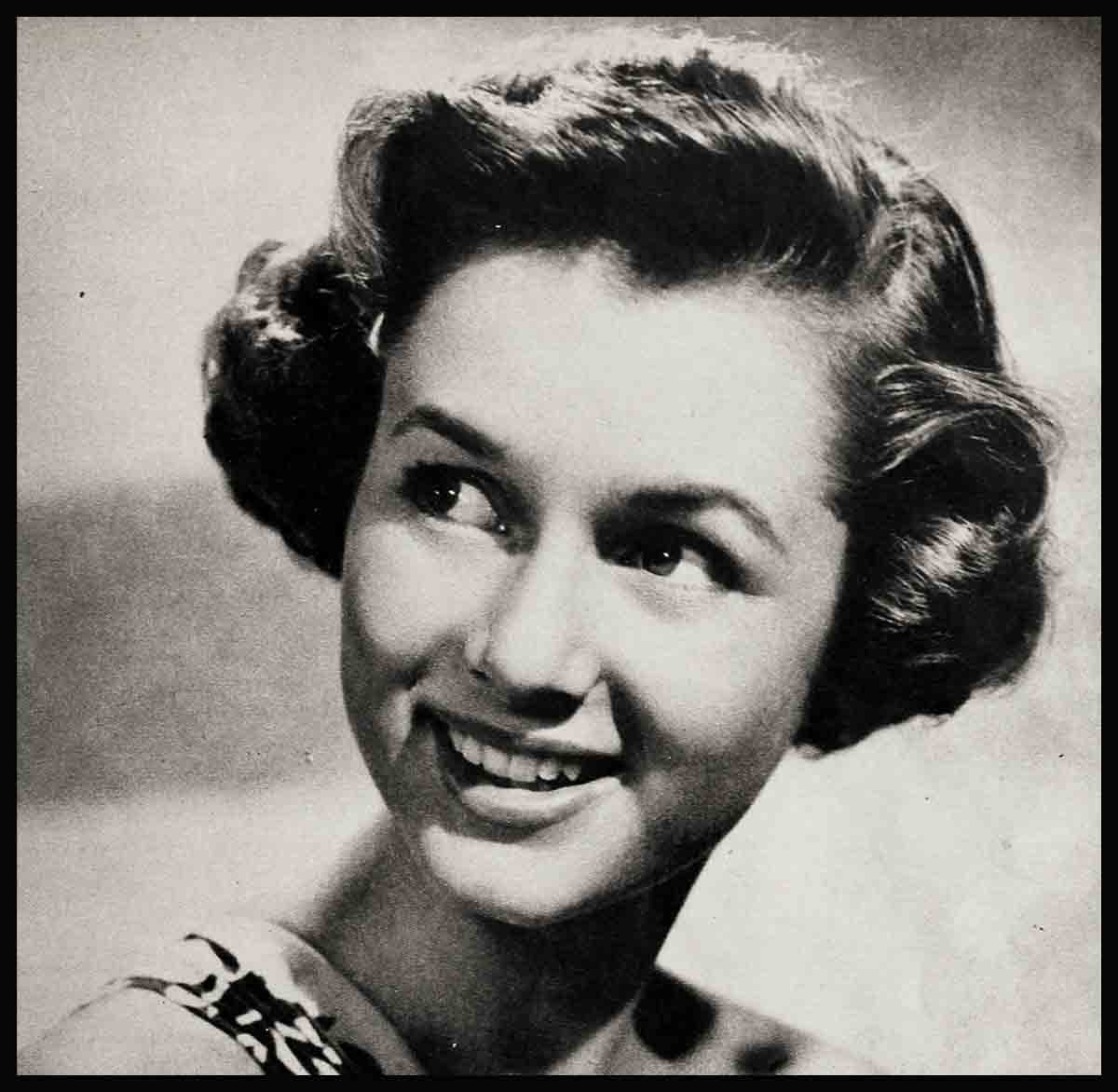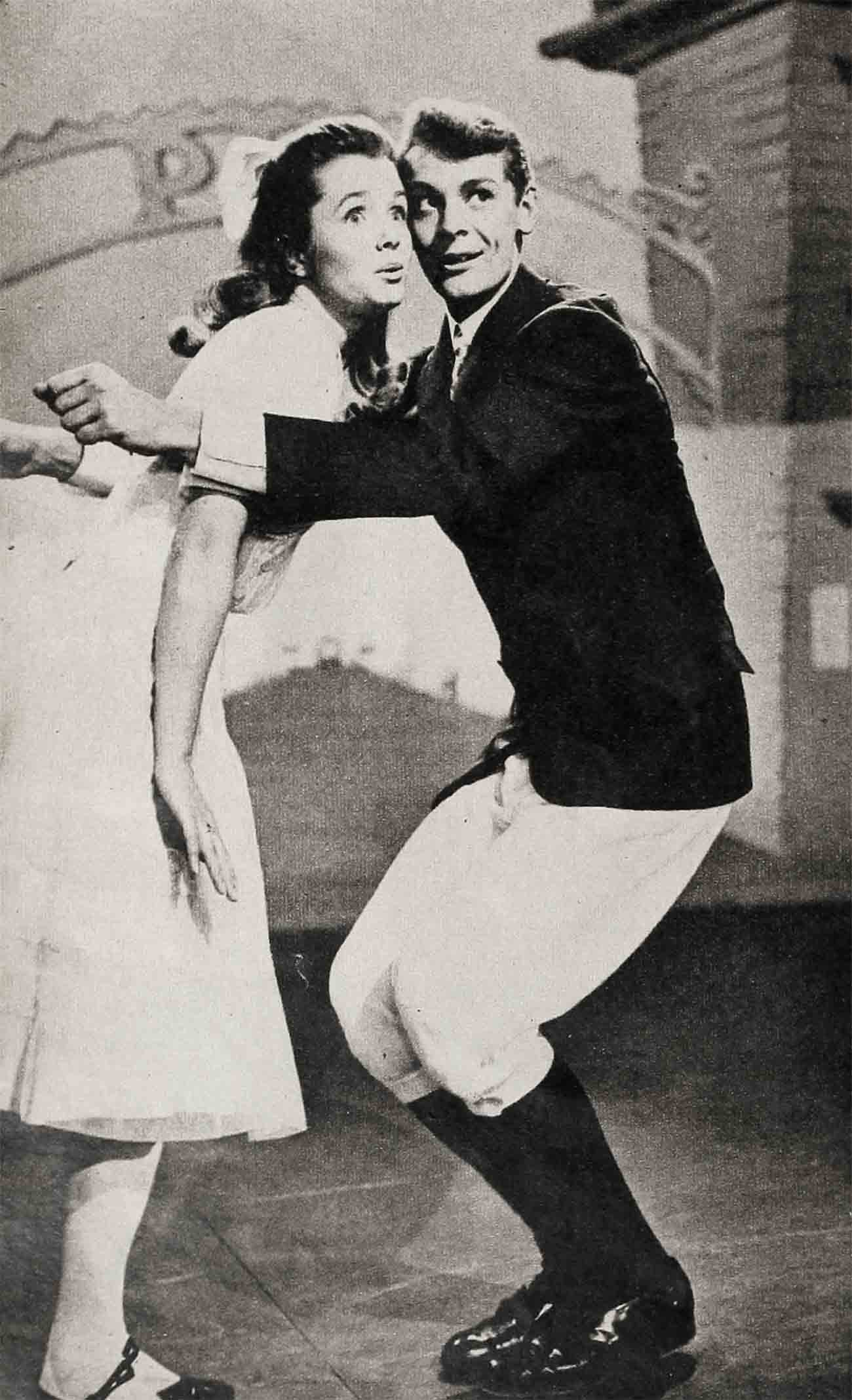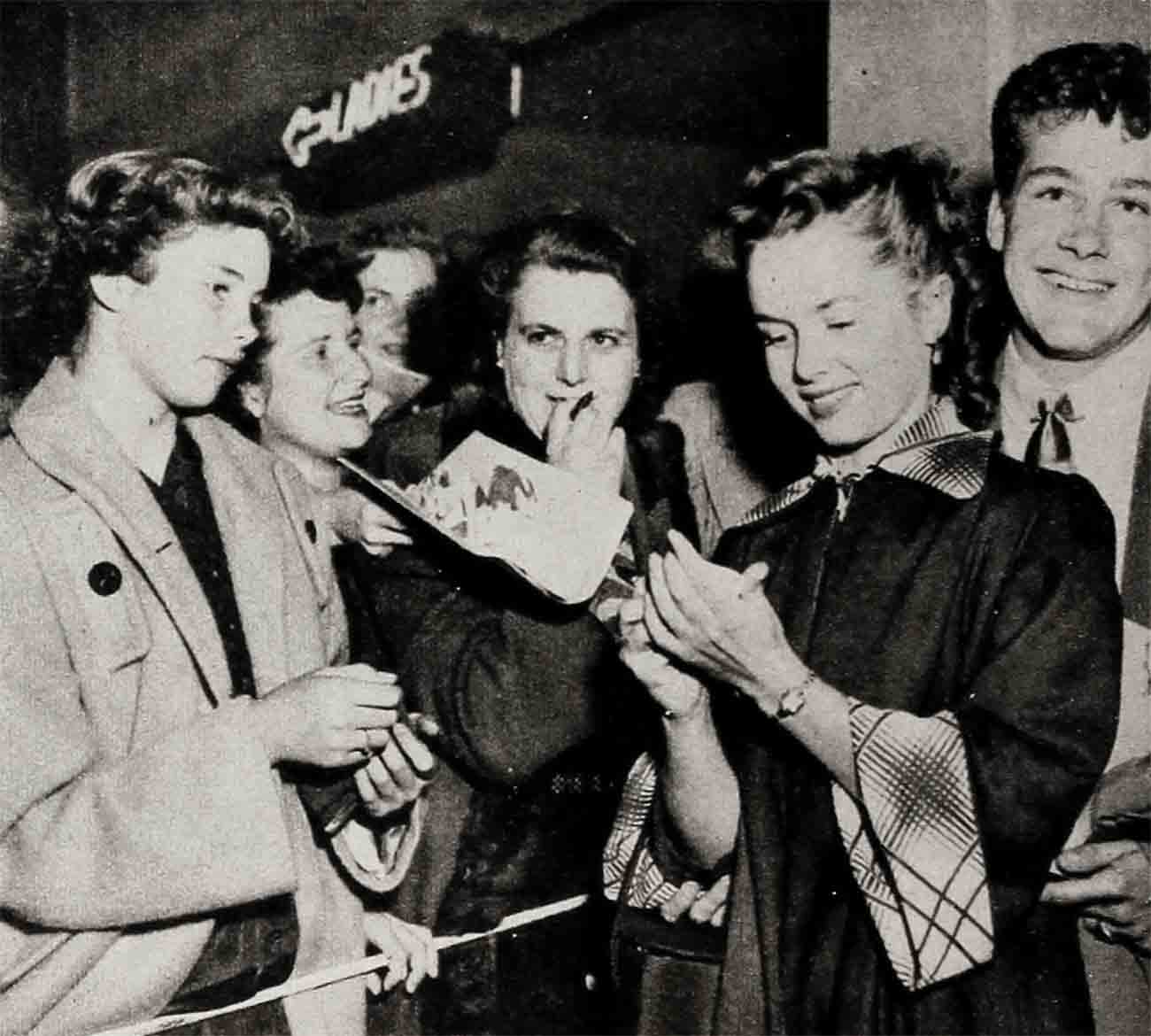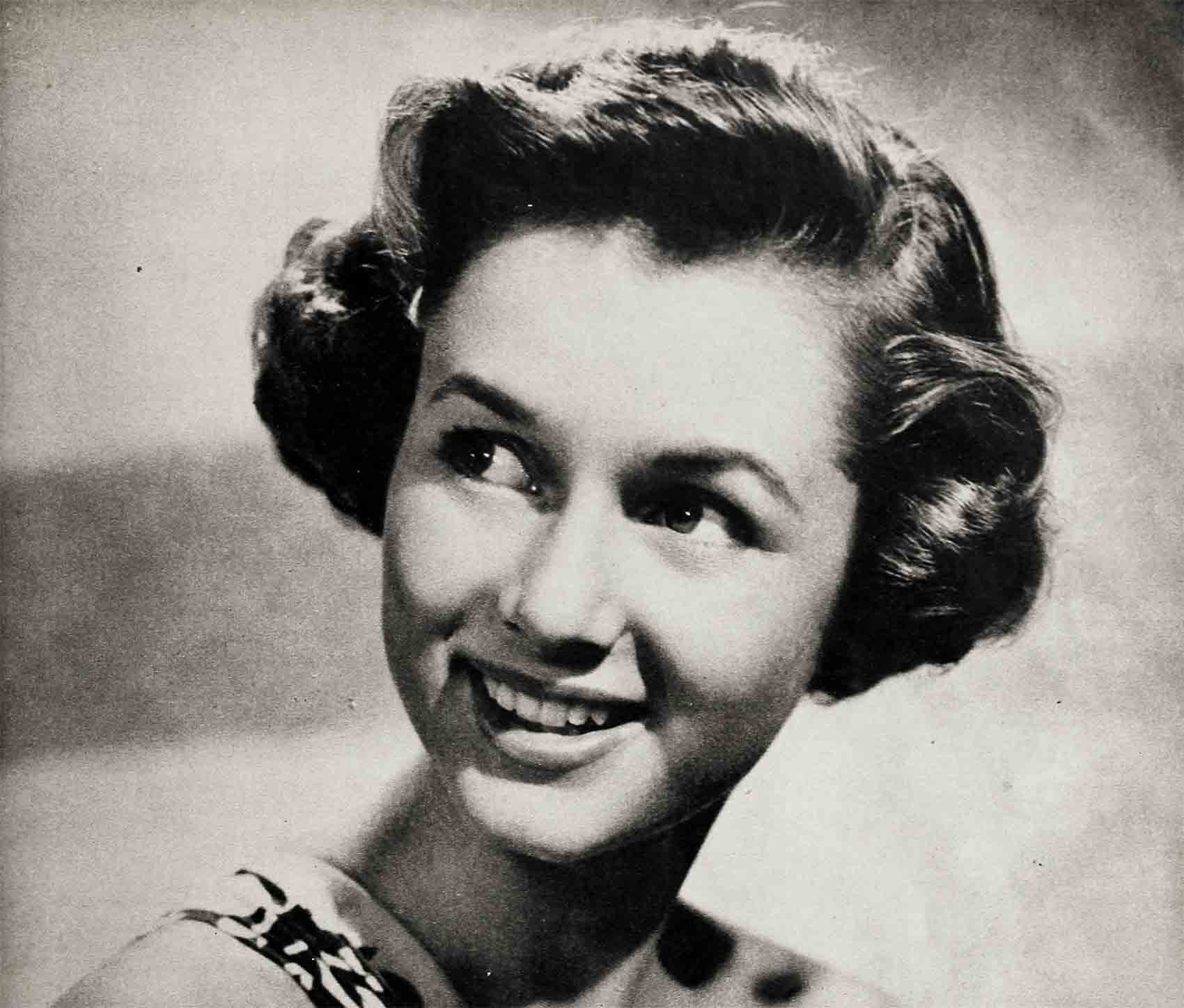
Abba-Dabba-Debbie—Debbie Reynolds
Gene Kelly stopped whirling the little featherweight doll in his arms, stepped back and frowned. He was patiently rehearsing the new numbers for Singing in the Rain and right in the middle of a romantic waltz, this crazy kid had tossed back her head and gone limp with laughter. Gene’s an exacting dance master; he doesn’t like foolishness mixed with business.
“Listen, Freshie,” he barked. “You know this is a sweet dance. The scene is love—not comedy. Why the yaks?”
“Oh, dear,” sighed Debbie Reynolds, “I’m sorry. But—well—I used to practically fall off my seat when I saw you on the screen. And here I am—actually dancing for a picture with Gene Kelly! I mean, it’s absolutely the end, don’t you see? I can’t believe it. I’m losing my mind! Isn’t it all just too killing?”
Gene leaned back against a ladder they used in another routine to digest this outburst before he grinned. But Debbie’s green eyes stared back in horror. “Don’t move!” she yelped. “My gum!” Kelly felt a few precious hairs leave his scalp as Deb leaped to the rescue. “I won’t park it there again,” she promised.
Gene Kelly didn’t really mind losing the hair, or the rehearsal time either. Like everyone else at MGM, he knows that just being around Debbie Reynolds is like having a double-shot from the Fountain of Youth—and what slight hangovers result are well worth it. As for Debbie Reynolds, she was making true talk; she’s having herself a real ball—and so is everyone even remotely exposed to her around Hollywood.
It was barely two years ago that a sputtering ’32 Chevvy sedan rattled through the formidable gates of Metro-Goldwyn-Mayer studios and skidded dust on the elegant, fishtailed Cadillacs parked inside. This ancient heap was a sight to behold. It sported a flashy dragon radiator cap, whirl away hubs, a raucous truck horn and Venetian blinds. One door flopped open when the brakes squeaked on, revealing seats covered with sporty chintz, and floors of flowered carpeting. Out stepped a pint-size 17-year-old girl with homemade curls piled on a head that seemed a little too big for her body. Her wide open eyes wore a startled look.
Clutching a brown paper sack of lunch in one hand, and a phonograph record in the other, she stepped right into the front office as if she owned the joint. And to tell the truth, since that memorable day, Debbie Reynolds practically does.
Not since Mickey Rooney shook that dignified studio loose back in his adolescent days, has MGM seen anything like Debbie. Like the wads of chewing gum she plasters at all strategic junctures, Debbie’s irresistible personality spreads, sticks, gathers friends, and influences people. Staid stars copy her, quote her, ask eagerly every morning, “What goes with Debbie today?” Debbie-isms buzz around the lot like flies.
Did you hear what Debbie said when she met June Allyson? “My,” she asked, “who’s that little girl?” Did you catch Debbie’s size-up of Pinza? “He may send the old ladies,” she stated, “but he doesn’t send me!” Have you heard what Arthur Loew got when he called Deb for a date? “I’m sorry,’ she told him, “but I’m going to Girl Scouts tonight.” Listen to Debbie’s description of her girl friend, Camille: “She’s beautiful, she has big walnuteyes.” Debbie’s nuts about doing Singing in the Rain. “It’s a period picture,” she says, “1928.” When Debbie lugged her lunch to the set, Jane Powell and then Gene Kelly started bringing theirs, too. She introduced stately Louis Calhern to dill pickles and before she ditched her jalop, Clark Gable told her he’d trade her his Jaguar, even. That’s the way the Debbie madness goes. But, it’s not all as crazy as it sounds, nor Debbie Reynolds either.

Debbie hasn’t come, seen and conquered strictly because she’s cute. What’s really making Debbie Reynolds’ stock soar in Hollywood is the solid conviction that she’s a natural bundle of relaxed talent, a girl Bing Crosby.
Debbie had never warbled a note professionally until Two Weeks With Love. But that “Abba-Dabba Honeymoon” she did with Carleton Carpenter rocketed right onto the Hit Parade, and the record they cut headed for the million-sale mark. She hadn’t danced either, but she was so smooth with Carleton that Gene Kelly asked for her, and Arthur Freed cast her without a test for Gene’s partner in Singing in the Rain. She hasn’t had a dramatic lesson worth mentioning, but she’s set to co-star with Carleton in Twenty-One Days,play a lead with Spencer Tracy in Years Ago, and make Everybody Swim with Esther Williams. At Metro, producers are lining up for Debbie Reynolds like stags for a Park Avenue debutante at the Ritz.
By now it’s taken for granted around MGM that Debbie Reynolds can handle anything you can throw at her. Just the other day producer George Wells, getting Everybody Swim ready to roll, with Debbie cast as a channel swimmer, thought he’d better check. He called Jack Cummings who made two of Debbie’s pictures. “By the way, Jack,” he said, “can Debbie Reynolds swim?”
“Listen,” he got back, “Debbie Reynolds can swim, float, or fly, if necessary. I’d bet on that gal to play the flugelhorn, walk a tight wire or bulldog a steer. Debbie can do anything. She’s sensational!”
Like a lot of sensational people, Debbie’s a transplanted Texan, from El Paso, where she arrived one April Fool’s day in 1932. “She came along about dinner time,” her mother recalls, “and she’s been hungry ever since.” Debbie still snaps off five to six meals a day, ranging from dill pickles and crackers to a triple jumbo strawberry malt. In Everybody Swim they have Deb eating all through the picture. “We can probably work faster if we just write her snacks into the script,” realistically concluded the producer. But where all the calories go, nobody knows.
Because, after 19 years of growing, Debbie tips on the light side of 100, rises only five feet above her kicks, shops for her jeans in the kids’ department, and mama has to make all her dresses because she can’t ever find a thing in size seven.
As a moppet, this peewee chassis earned Debbie nicknames like “Runt,” “Peanuts,” “Shrimp,” and “Squirt,” although the genteel tag was “Frannie,” her real name being Mary Frances. It also handed her an unrepressed urge to show the world that she was rough, tough, and hard to bluff. “Deb was just as ornery as a baby as she is now,” her mom sighs. The girlhood—or tomboy-hood, to be more accurate—of Mary Frances Reynolds is studded with violent rebellions against the ignominy of skirts.

She built a fire under her house when she was just a brat, and only the lucky arrival of the neighbors in the nick of time saved the place from cinders. One boy who called her “sis” got knocked out colder than a cucumber against the schoolyard wall. She played basketball, baseball, yep, football, too. She was all-sex tetherball champ at an early age, and a whiz on the parallel bars. She glowed when the kids said, “Gee, she’s fun—just like a guy!”
Once the principal hot-footed it out to her house with some shocking news. “Mrs. Reynolds,” he began solemnly, “are you aware that Mary Frances swears?” Mrs. Reynolds nodded. “What happened,” she asked, “was some boy pushing her around?” That was the case, the master admitted. Mrs. Reynolds wanted to know something else. “Did she do a good job?” The principal said Frannie’s swearing was inspired, even artistic. “Her uncle taught her how,” explained her mom; and the principal retired with only that satisfaction.
But Debbie’s declared admiration for boys turned to undeclared war at a certain point in her development. When the tender passion stirred others along about ninth grade, Deb told off her suitors rudely. With some other misanthropic girl chums she founded the “NN Club.” “NN” stood for “Non-Neckers,” and her mother made little pottery pins with the initials which Debbie and her colleagues wore proudly on their militant bosoms. “When the boys asked us to go out,’ she remembers, “we just answered, ‘What for?’ That stopped ’em.” But fairly soon the “NN” had to add an initial. One traitorous girl defected and fell in love. “After that,” sighs Deb, “we changed the name to “Nearly Non-Neckers.”
Instead of mooning and making eyes, Dauntless Debbie channeled her atomic energies into other female fields. At John Burroughs High in Burbank, she became a Big Operator and Activity Girl. “If there was anything around I wasn’t mixed up in,” she says, “I don’t know what it was.” Debbie was either president or some high brass of the Girls Athletic Association, the Tri-Y, Tennis Club, Job’s Daughters, and an all-out Girl Scout, which she still is. She sang baritone—that’s right—in the Choral Society and tooted the French horn in the Youth Symphony and the BHS band. “You couldn’t see m horn,” admits Debbie, “but you hear me.” She was also a demon baton twirler, and leader of Dick Layland’s Batoneers, a precision marching group 60 prancing fillies, who paraded all over Southern California and collected trophies which still clutter up Debbie’s closet.

With that background, it was obvious i that nothing could be staged around Burbank without Frannie Reynolds, and have any bounce at all. So when the big “Burbank on Parade” fiesta loomed, back in 1948, her girl friends talked her into the “Queen of Burbank” contest. It was about the first thing Debbie had ever had to be talked into, but the way she figured, this was a little out of her line.
The princesses were picked for Beauty, Talent, and Personality. That last tag was all Debbie figured she could possibly rate. No one had ever called her beautiful, and oddly enough, the one activity where she definitely dudded was school dramatics. She couldn’t win even a bit part and hustled scenery cheerfully, convinced that stage glamor wasn’t for her. “But kid,” the girls told her, “every girl who enters this deal gets a free blouse. Don’t be stupid!” Debbie could always use a new blouse. There wasn’t any money to spare and never had been around the Reynolds house.
She signed up with 28 other BHS belles, just for the blouse, but to earn it Debbie dug up a cutie routine that always wowed the drop-in trade at her house on Sunday afternoons. Deb liked to twirl a record of Betty Hutton’s and mimic the Huttontot’s gymnastics without singing a word. She could be Betty all over the place, and it was always good for a laugh. She packed up the platter of “A Square in a Social Circle,” curled her hair for once, and submitted to a glamor gown her mom had whipped up for Easter. For the final touch she borrowed Mrs. Reynolds’ white high heeled shoes, the first wobblers she’d ever worn in her life. They almost threw her. When she stepped out to spin her Betty Hutton disk and make with the act, she just couldn’t move around. Debbie stopped the music and, in her easy fashion yelled, “Can I take off my shoes?” The crowd roared, “Sure.” So she shook loose her hair-do, eased the glamor gown here and there, and kicked the high heels out into the crowd. Then she knocked herself out—and they liked to died clapping. She gathered that she’d earned her shirt—but that was all.
“I was leaning against a piano in back because my feet hurt, figuring how I could sneak out, go home and get something to eat,” recalls Debbie, “when I heard this man call off the winners. ‘Princess Beauty—Princess Talent—Princess Personality’—none of them me, of course. Then what does he say but ‘And Queen of all Burbank—Miss Mary Frances Reynolds!’ Well, that was the end, simply the end! They shoved me out on the stage and—for the first time in my life, I couldn’t say a thing. Imagine!”
She got enough voice back to say, “Yes,” when Solly Biano, a Warner Brothers’ talent scout and 2 contest judge, offered all the lucky winners screen tests. Debbie had heard “awful things about the movies” but decided to take a chance, since Warners was right around the corner in Burbank, and she reasoned she couldn’t go wrong that close to home. She did a skit from The Bachelor and the Bobby Soxer—in other words, acted herself—and came up with a stock contract. She got $65.00 a week, which after court deductions, left her with $29.00 each Saturday. First thing she did was buy a second-hand player piano, and a French horn of her very own.
At Warners she also collected the name “Debbie” which seemed to fit (even her mother calls her that today), two weeks of dramatic lessons, and finally a bit part as June Haver’s sister in The Daughter of Rosie O’Grady. But mostly Debbie just polished off her junior year at the studio school, and poked her inquisitive nose into every corner of the lot. “I knew everyone around the place,” she says, “even the cats. I used to take visitors on studio tours.” But they don’t pay contract salaries forever for that, and there was really nothing on the lot for Debbie to do. After a year she learned the news—not necessarily bad, because she was eager then to get back to Burbank High, go on to college, and be a gym teacher—that she was out.
But when Warners dropped Debbie she didn’t have time to bounce back toward Burbank High. MGM caught her on the fly four days before her option expired. Solly Biano knew about MGM’s search for a tiny cutie to impersonate Helen Kane, the old “Boop-boop-a-doop Girl” of the ’thirties in Three Little Words, so he sent Debbie over to Producer Jack Cummings with her Betty Hutton record. Jack had to look only once. He used Helen’s bonafide boops and Debbie’s gestures. It was just a spot—but with Debbie Reynolds, spots spread, like measles.
All this popularity and progress hasn’t turned Debbie Reynolds’ head one notch, or changed her private life very much. Instead of a star, which she soon will be officially, she looks like somebody’s kid sister, which she is, too. In Washington on her tour, she was mobbed for the first time and one girl blurted, “But she looks so human!” And just the other day, making a futile stab at shopping for an evening gown, Deb invaded a swank Beverly Hills shop, picked out a glamor rag she kind of liked. “I’ll take—” Deb began, but before she could finish the sentence, the lady whisked it out of her hands. “It’s a hundred dollars, honey,” she explained. “You couldn’t afford that.”
Until Deb sold it to get her “blue bottom Pontiac,” she was perfectly content with her sensational dolled-up jalopy. Debbie scared up the decomposed ’32 Chevvy, as old as she was, for $20.00. Her dad, who can fix anything, made the motor run. Her Mom, who can sew anything, upholstered the tattered seats and made sofa pillows. Debbie added the carpets, the dragon radiator cap, and truck horn. But nobody could do much about the brakes.
Herding it into Hollywood one night with a couple of girl friends, Debbie weaved and swerved each time she touched the pedal and finally a cop wailed her down. “What you been drinking, sister?” he asked. “A malt,” answered Deb honestly. He flashed the light in the girl friends’ faces. “How about you?” “Cokes.”
The, cop wagged his head. “You kids get home before I call the truant officer.” Debbie had already made two pictures.
As yet, Debbie’s never had a drink (she doesn’t smoke either) partly because she needs stimulants like a hole in the head, but mainly because it’s against her religion. There’s not a drop of liquor in her house, and that house, along with the people who live there, is still the center of her world.
The little FHA cottage her dad built on Evergreen Street is all paid for by now, which was project Number One after Debbie got slightly in the chips. Project Number Two was fixing up her room with a new salmon-pink rug, ruffled curtains, and blond furniture, Next comes fencing the back yard and building a barbecue. Then, “I’d like a small swimming pool,” dreams Debbie, “so I won’t have so darn much grass to mow.”
Debbie’s chosen chores are cleaning up the yard, helping her dad hammer things into shape around the house, and taking care of Chip, a shaggy dog, and Mike, a crotchety cat. Inside the house, though, Deb’s a flop. It’s rough to get her to wash any dishes, cook or tidy up. She’s the type who steps out of things and leaves them where they lay. Her mother, Maxene, a cheery youngish woman, long ago despaired of endowing Deb with many dainty feminine graces. Perfume, makeup, jewelry, and dressy doo-dads are anathema to her, and Deb frankly admits, “I hate baths.” “Sometimes,” chuckles Mrs. Reynolds, “I think I had two boys.” Lately, a ray of girlish hope came along with Debbie’s collection of monkey dolls which now festoon the house, brought about, of course, by that “Abba-Dabba Honeymoon” craze. Then there’s the baby she’s expecting.
It’s really her sister-in-law’s (her name’s Joyce) baby. Joyce lives at the Reynolds’ now while her husband Bill’s at camp. The blessed event is expected in the fall. But when Joyce explained that to Debbie she answered, “Well you’ll just have to hurry up. I can’t wait that long!” The facts of life are slightly confused in Debbie’s mind. Way back last winter when she was on her p.a. tour, she was interviewed on the “Welcome Stranger” program in Chicago and they asked about the most exciting event in her life. “Oh,” replied Deb, “I’m going to be an aunt almost any minute!”
But there’s no confusion in Debbie’s mind about the fierce loyalty she maintains for her family and friends. Already “her” baby has enough blankets and woolly gear stacked up to keep it warm in Alaska. Last Father’s Day she surprised her dad with a new runabout. And when the preview of Two Weeks With Love came up last year, the studio ticket machinery almost broke down. Deb asked if she could bring someone with her, and got a yes. The “someone” turned out to be 20 kids rounded up in the neighborhood. Or, as a harassed Metro press agent moaned, “All Burbank.”
For Debbie’s heart still belongs to Burbank, not Hollywood. By now she’s a sort of civic fixture. Whatever’s cooking in her home town, whether it’s decorating a float for the Tournament of Roses, or plugging the Youth Symphony, Deb’s right in on the act. “There’s not a cop in town I don’t know,” Debbie beasts.
Debbie’s favorite all-out activity is still the Girl Scouts. She was a “Curved Bar” Scout herself, which corresponds to an Eagle Scout, and today she’s Co-Leader of the Burbank troop. Every rare studio recess she’s off with the outdoor girls to their camp at Frazer Park in the mountains. Debbie recently contributed $300 of her movie earnings to rig up an outdoor theater. At Frazer she cooks, scrubs, builds fires, and washes dishes with a fervor that would make her mama swoon with surprise at home. But Debbie thinks it’s a salutary hobby. “Getting down to earth with those teenagers,” she says, “keeps me from going off the track with all this Hollywood jazz.”
Right now there doesn’t seem to be much danger of Debbie Reynolds going off her trolley about any kind of “Hollywood jazz,” particularly the variety called “Hollywood romance.” Hollywood gossips find it rough going indeed with Deb, and so do Hollywood wolves.
“Oh, I can go along with a good-night kiss,” she’ll tell you, “but frankly, it doesn’t do anything for me.” This is her way of saying she’s not in love. In fact, she has 10 five dollar bets spread around MGM that she won’t get married until she’s 24.
Debbie has dates, but she scatters them like buckshot. Most are young fellows around Burbank and Hollywood who don’t pack the kind of money to take her whirling off to the Mocambo or Ciro’s. She’d rather go bowling anyway, to a movie, or the circus—“I lose my mind at the circus,” Deb sighs. Most nights, though, she sits contentedly at home, writing letters to the 60-cdd GI’s in Korea who are her pen pals, reading Western two-gun thrillers, or entertaining her dates with records. Janet Leigh’s ex-boy friend, Arthur Loew, Jr., is nearest to a Hollywood glamor suitor. But half the time—because of Girl Scouts and things—he can’t get a date with Debbie. When he does and arrives decked out for a big dine and dance evening, he winds up eating enchiladas with the folks.
There was a time, in fact, when Debbie Reynolds was firmly set on being a spinster, but she’s changed her plans about that. She loves kids, and by now she knows you can’t have kids by yourself. “I’d like 20,” says Debbie, “but I guess Id settle for six. Imagine—six kids, most of them boys! Wouldn’t that be the very end?”
That’s just Debbie Reynolds’ manner of speaking, of course. Right now, it’s pretty hard to imagine anything actually being the end for Debbie Reynolds, the way she’s steaming along. Anyone who knows anything about Hollywood or Debbie will tell you that this is just the beginning. And for a beginner, Debbie Reynolds, to put it mildly, is doing strictly okay.
THE END
—BY KIRTLEY BASKETTE
It is a quote. MODERN SCREEN MAGAZINE SEPTEMBER 1951





No Comments